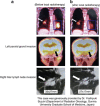Immunogenic tumor cell death induced by chemoradiotherapy: molecular mechanisms and a clinical translation
- PMID: 23788045
- PMCID: PMC3702303
- DOI: 10.1038/cddis.2013.207
Immunogenic tumor cell death induced by chemoradiotherapy: molecular mechanisms and a clinical translation
Abstract
Chemoradiotherapy can induce immunogenic cell death, triggering danger signals such as high-mobility group box 1 protein, and resulting in T-cell immunity. This concept can potentially be harnessed for clinical therapy to enhance tumor-specific immunity. There is however limited information to translate this theory directly in a clinical setting. In this review, we will discuss and summarize molecular and cellular mechanisms underlying immunogenic tumor cell death induced by chemoradiotherapy, with emphasis on a clinical translation.
Figures



References
-
- Ishikura S, Nihei K, Ohtsu A, Boku N, Hironaka S, Mera K, et al. Long-term toxicity after definitive chemoradiotherapy for squamous cell carcinoma of the thoracic esophagus. J Clin Oncol. 2003;21:2697–2702. - PubMed
-
- de Manzoni G, Pedrazzani C, Laterza E, Pasini F, Grandinetti A, Bernini M, et al. Induction chemoradiotherapy for squamous cell carcinoma of the thoracic esophagus: impact of increased dosage on long-term results. Ann Thorac Surg. 2005;80:1176–1183. - PubMed
-
- Polischouk AG, Grenman R, Granath F, Lewensohn R. Radiosensitivity of human squamous carcinoma cell lines is associated with amount of spontaneous DNA strand breaks. Int J Cancer. 2001;96:43–53. - PubMed
-
- Mole RH. Whole body irradiation; radiobiology or medicine. Br J Radiol. 1953;26:234–241. - PubMed
Publication types
MeSH terms
Substances
LinkOut - more resources
Full Text Sources
Other Literature Sources

